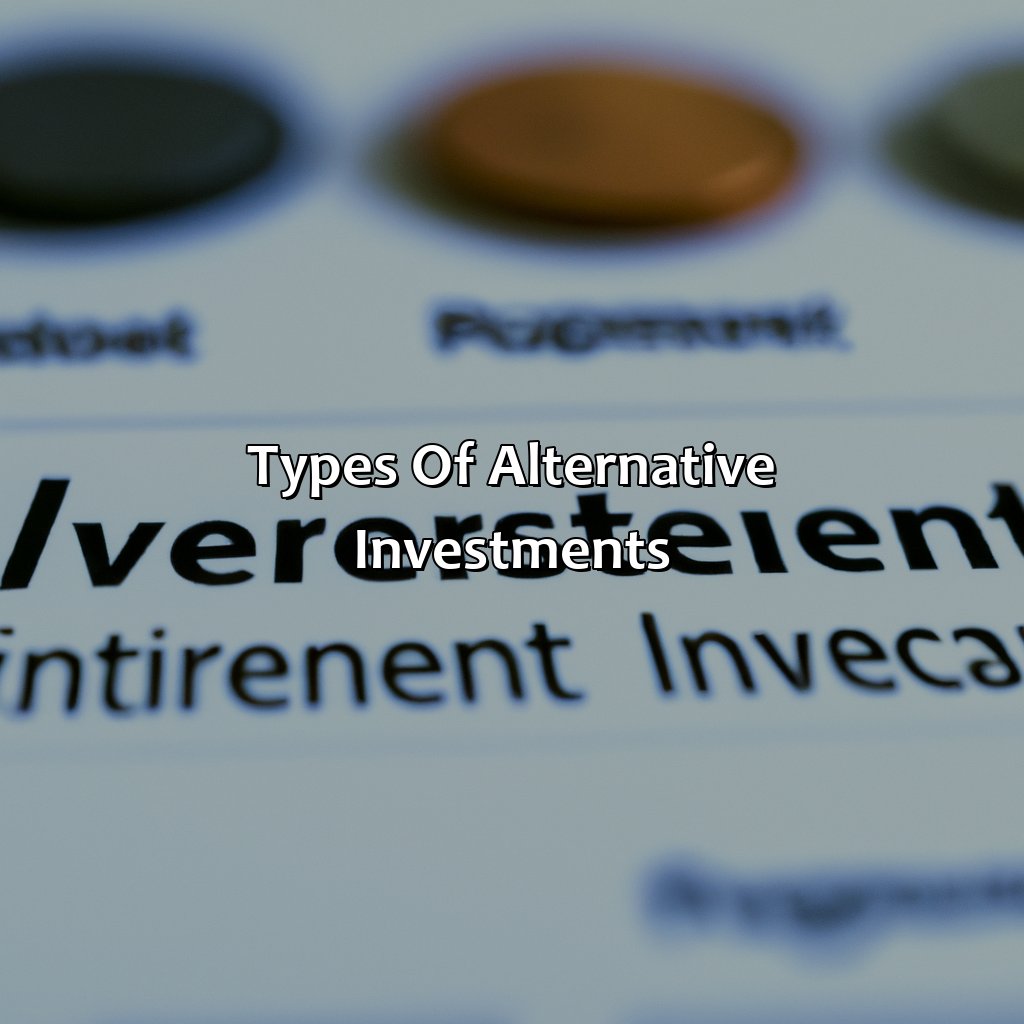What Is An Alternative Investment?
Key Takeaway:
- Alternative investments can offer new opportunities for portfolio diversification beyond traditional stocks and bonds, potentially reducing overall investment risk.
- Depending on the type of alternative investment, there may be potential for high returns that exceed those of traditional investments, especially in the case of private equity and hedge fund investments.
- Investing in alternative assets can also pose certain risks, such as illiquidity and limited regulation, which should be carefully considered before making any investment decisions.
You want to diversify your investments, but don’t know where to start? Alternative investments offer a way to diversify your portfolio and reduce your financial risk. Read on to learn more about this lucrative option.
Types of Alternative Investments
Gain exposure to a range of investments by exploring alternatives. We’ll cover the different types, such as real estate, private equity, hedge funds, and commodities. Investing in each can bring great rewards.

Image credits: retiregenz.com by Joel Arnold
Real Estate Investments
Real estate investments refer to the acquisition and management of property for the purpose of generating income. This includes a wide range of assets, such as commercial buildings, residential real estate, and land. Investors in this alternative asset class benefit from diversification, potential capital appreciation, and passive income streams through rentals or lease agreements. Additionally, investors can often take advantage of tax incentives and leverage to maximize returns.
One popular form of real estate investment is through REITs (real estate investment trusts), which allow investors to invest in a diversified portfolio of properties while enjoying the liquidity and transparency of publicly traded securities. Private equity real estate funds are another avenue for investing in real estate, offering access to more exclusive projects and higher potential returns but typically requiring higher minimum investments.
Pro Tip: Before investing in real estate, conduct thorough due diligence on the property or fund being considered to ensure it aligns with your investment goals and risk tolerance level. Investing in private equity is like playing a game of shark tank – only the sharks are actually your investment partners.
Private Equity Investments
Investments in companies that are not publicly traded or listed on a stock exchange are known as private investments. These investments are called private equity investments, and they involve investing in a company with the aim of providing funding for growth, restructuring, or expansion activities.
Private equity investments function by using a combination of funding from limited partners, venture capitalists, and high-net-worth individuals to purchase equity in a private company. This may include purchasing existing shares in the business or providing new funds that the company can use to expand its operations.
One of the key benefits of private equity investments is the potential for higher returns due to their illiquidity. These types of investments often require long lock-up periods where investors cannot sell their shares, which means that they are less volatile compared to public market securities.
While private equity investments can be lucrative, they also come with significant risks. Investors may have limited information about the company’s operations and financial performance which could lead to poor decision making during investment selection.
Recently, rumors have been circulating about a well-known hedge fund manager who made millions from his private equity investments. The manager used his expertise to identify undervalued startups and capitalized on their growth potential by investing early on.
Why invest in a hedge fund when you can just throw your money into a real hedge and watch it grow?
Hedge Fund Investments
Within the spectrum of unconventional investments, hedge funds stand out as a popular subset. Hedge funds refer to a type of pooled fund managed by investment professionals and often catered towards high-net-worth individuals and institutional investors. They utilize complex strategies and tools to diversify their investments and generate returns beyond traditional markets.
Hedge funds can be leveraged or unleveraged, depending on the level of risk desired. Often, these funds use various derivatives, like options and futures, to amplify potential returns. Similarly, they can invest in diverse assets such as stocks, bonds, commodities or even currencies. Because they are less regulated than mutual funds or exchange-traded funds, hedge funds have greater flexibility in their investment approach.
One defining characteristic of hedge funds is that they are not required to disclose their holdings publicly compared to other types of investment companies. As a result, hedge fund managers retain greater autonomy over management decisions without external influence.
Pro Tip: Hedge funds offer sophisticated strategies used by financial elites but choosing the right manager requires extensive research on performance history and management style.
Want to diversify your portfolio? Invest in commodities – because nothing says financial stability like betting on the price of pork bellies.
Commodities Investments
Investing in physical commodities is a non-traditional investment option. This includes investing in non-financial assets such as precious metals, agriculture, energy, and raw materials. Historically, these investments have provided a hedge against inflation and a way to diversify investment portfolios. Commodity investors can engage in buying futures contracts or investing in Exchange-Traded Funds (ETFs) that hold commodity futures contracts.
One unique feature of commodity investments is that their prices are mainly affected by supply and demand factors rather than market trends. Factors such as natural disasters, geopolitical tensions, and weather conditions can influence the prices significantly. Therefore, it requires careful consideration of the global economic situation before making investment decisions.
Pro Tip – It’s crucial for commodity investors to stay up-to-date with the latest news regarding supply disruptions or demand changes that can impact commodity prices. Keep an eye on market fluctuations due to global events to make informed investment decisions.
Putting the ‘alt’ in alternative investments – earn those doughnuts and diversify your portfolio!
Benefits of Alternative Investments
Invest in something different! Diversify your portfolio. You’ll get high returns with no correlation to the market. It’s a sure-fire solution that’ll give you unique benefits.

Image credits: retiregenz.com by Yuval Washington
Portfolio Diversification
Investment diversification: Allocating assets to various alternative investments reduces portfolio risk and volatility, leading to a positive impact on financial performance. A diversified investment portfolio can include real estate investments, cryptocurrency, hedge funds, private equity, and other non-traditional assets. Alternative investments allow for minimizing market fluctuations and offer unique returns that correlate less to equities and bonds.
Alternative investments help investors’ portfolios reduce their exposure to market risks by providing attractive return options that are uncorrelated with traditional asset classes. This diversification helps shift some of the portfolio’s risk to non-market factors such as industry-specific or idiosyncratic conditions.
Alternative investment funds typically have lower liquidity than other asset classes but may provide higher returns in both bull and bear markets. The time it takes an investor to liquidate these holdings is often longer than expected, adding another layer of risk.
According to Forbes’ 2021 Alternative Investment Predictions report, diverse investment portfolios have been becoming increasingly popular among high net worth clients as an essential element for alpha-generation and income generation.
Who needs a crystal ball when you have alternative investments for those high potential returns?
High Potential Returns
Investing in non-traditional assets can result in significant gains. By diversifying portfolios with niche investments, returns that exceed standard market rates can be achieved. Alternative investments, such as private equity and real estate, offer unique opportunities to invest in less liquid markets. Due to high demand or rarity, these investments offer high potential for returns.
Alternative investments circumvent the constraints of traditional public markets and provide an avenue for investors to access new revenue streams. A lack of correlation between non-conventional assets and typical market trends further mitigates the risk involved. Investing in alternatives requires careful consideration and risk management, but optimized correctly, they are well-suited to enhance portfolio performance while also providing diversification.
Pro Tip: Diversification is essential when investing in alternative assets – allocating a portion of funds into multiple investment channels will decrease the overall risk involved.
Who needs a crystal ball when you’ve got alternative investments to diversify your portfolio and dodge the market’s wild swings?
Limited Market Correlation
Investments that are not directly correlated with the market trends offer a great shield against the uncertainties of the financial world. Such investments, referred to as alternative investments often have a low or negative correlation with traditional stocks and bonds, offering investors a way to diversify their portfolios.
This distinct feature of alternative investments stems from their nature of being less reliant on market fluctuations compared to conventional assets. By reducing overall portfolio volatility, these investments provide stability during times of crisis and allow for consistent returns over an extended time horizon.
In contrast to publically-traded securities that are influenced by broad economic indicators such as interest rates, GDP, inflation; private equity, hedge funds, real estate and other forms of alternative investments are directly tied to underlying assets or businesses. This makes them comparatively immune to sudden market movements or black swan events.
Pro Tip: Building a diverse range of non-correlated alternative assets can help mitigate risks associated with market volatility while maximizing potential returns.
I guess the saying ‘no pain, no gain‘ also applies to alternative investments, except in this case it’s ‘no risk, no reward‘.
Risks of Alternative Investments
Curious about the risks of alternative investments like private equity or hedge funds? Check out this section on ‘Risks of Alternative Investments’ for insights. You’ll find ‘Illiquidity Risk’, ‘High Minimum Investments’, and ‘Limited Regulation’ as possible drawbacks. Get a quick intro to each sub-section and learn more!

Image credits: retiregenz.com by David Arnold
Illiquidity Risk
Given the unique nature of alternative investments, one of the risks associated with them is the lack of liquidity. This refers to the difficulty investors may face when trying to sell their stake in an asset that is not easily traded in a public market. The assets can have long lock-up periods and redemption restrictions that limit access to capital.
Illiquidity risk could lead to an investor losing out on other investment opportunities, as funds are tied up in illiquid assets. Once committed, it can be difficult for investors to withdraw their money or find a buyer for a proportionate share of its value. Additionally, valuation becomes uncertain without an established market rate.
Investors who do not consider the illiquidity risk associated with alternative investments may find themselves unable to access cash when it’s needed most or feeling constrained by decisions they made years ago. It’s important to weigh this risk alongside potential returns when making investment decisions.
Looks like the only thing ‘alternative’ about alternative investments is the sky-high minimum investment requirement.
High Minimum Investments
Alternative investments often come with a steep entry cost that may deter some investors. The initial investment required to participate in such ventures is commonly higher than traditional options, which tends to limit this market’s accessibility.
Moreover, specialized knowledge and due diligence are paramount in selecting suitable alternative investments while maximizing returns and mitigating risks. This can further prevent investors from moving forward with their plans to diversify into alternatives.
It’s important to carefully consider one’s financial goals and risk tolerance before investing in any asset class or investment vehicle. However, high minimum investments can impede portfolio diversification efforts for those who cannot afford them.
Pro Tip: One way to access alternative investments without the need for substantial upfront capital is through crowdfunding platforms that offer fractional ownership.
Remember, with alternative investments, there’s no referee blowing the whistle when things go wrong – you’re on your own with your losses.
Limited Regulation
Alternative investments are exposed to the potential lack of supervision, also known as Regulatory Risk. Alternative investments are subjected to limited regulatory scrutiny compared to their traditional counterparts. The regulation for alternative investments varies by country and can differ greatly from one region to another.
Examples of alternative investments consist of private equity funds, hedge funds, art collections, and cryptocurrency investment assets. These types of alternative investments are typically only overseen by their internal compliance departments or established industry organizations such as ICFA or AIMA.
Given that there is no standardized approach to the regulation process of these types of investments, it paves the way for dishonest fund administrators and advisors who engage in malicious practices such as insider trading and market manipulation which is classified as white-collar crimes. Investors must conduct thorough due diligence measures before investing in an alternative investment as most have little transparency.
It is highly advisable that investors seek counsel from independent financial advisers or specialized attorneys who possess extensive knowledge in alternative investments before investing their money. As a further measure against risk, investors should also conduct routine checks on the fund’s regulatory compliance status. Proper diversification of your portfolio can also help minimize some risks associated with alternative investment such as liquidity risk or liquidity shortage risk.The mitigated risks outweigh the opportunities for high returns when conducting comprehensive research on your chosen investment prior to any commitment makes financial sense.
Five Facts About Alternative Investments:
Alternative investments are non-traditional asset classes that provide diversification to a portfolio. (Source: Investopedia)
Examples of alternative investments include real estate, private equity, hedge funds, commodities, and collectibles. (Source: Forbes)
Alternative investments are generally less liquid than traditional investments and may have higher fees and lower transparency. (Source: The Balance)
Alternative investments have gained popularity in recent years as investors seek ways to enhance returns and reduce risk. (Source: CNBC)
Alternative investments require a higher level of due diligence and may not be suitable for all investors. (Source: Financial Planning)
FAQs about What Is An Alternative Investment?
What is an alternative investment?
An alternative investment is a non-traditional investment that does not fit into the traditional asset classes of stocks, bonds, and cash. It can include investments such as real estate, hedge funds, private equity, commodities, and collectibles.
What are the benefits of investing in alternative investments?
Alternative investments can provide diversification to a portfolio and potentially higher returns compared to traditional investments. They also have the potential to be less correlated with the stock market, providing a hedge against market volatility.
What are the risks associated with alternative investments?
Alternative investments typically have a higher level of risk associated with them due to their non-traditional nature and lack of regulation. In addition, they often require a higher minimum investment and may have limited liquidity, making it difficult to sell or exit the investment.
Who is a good candidate for investing in alternative investments?
Investors with a high net worth and a long-term investment horizon may be good candidates for investing in alternative investments. Due to the higher level of risk and potential illiquidity, it is important for investors to have a well-diversified portfolio and a thorough understanding of the potential risks and rewards of each alternative investment.
How can one invest in alternative investments?
Investing in alternative investments typically requires a larger minimum investment and a certain level of sophistication or expertise. One can invest in alternative investments through a private equity firm, hedge fund, or by purchasing shares in a publicly-traded alternative investment fund.
What should one consider before investing in alternative investments?
Before investing in alternative investments, it is important for individuals to consider their investment objectives, risk tolerance, and financial goals. They should also thoroughly research each investment opportunity and seek professional advice to ensure that they fully understand the potential risks and rewards of each investment.
 Checkout this IRS Loophole
Checkout this IRS Loophole 
